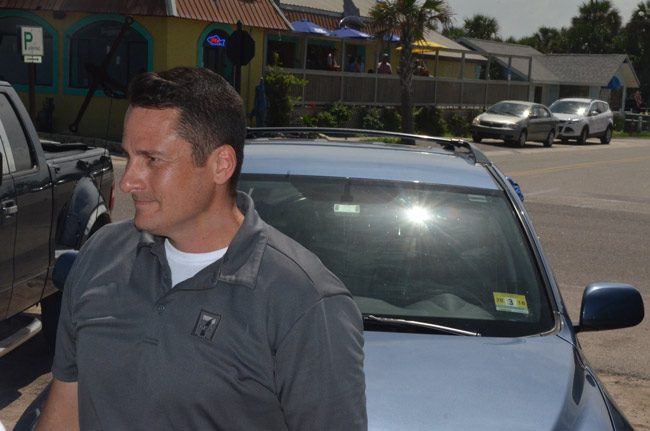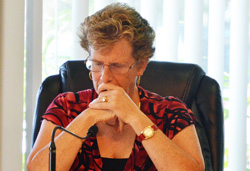
For 15 years Eric Cooley worked the grind as a regional director for Auto Zone, overseeing 1,500 employees and big budgets. He then decided to “dial that back,” in his words. “I said, you know what: I want a store on the beach.”
He found the 7-Eleven on A1A in Flagler Beach, but he didn’t find a slower pace: when he’s not working at the store, he’s attending city commission meetings, where he’s hardly missed a meeting in three years, or serving on one of three city government advisory boards—planning, economic development, police pension. When he’s not doing that, he’s volunteering his time for one civic initiative or another, usually through what’s come to be known as the Flagler Beach All Stars, a trio made up Flagler Beach Mayor Linda Provencher, Cooley and Carla Cline.
He addresses the commission and boards often, but never as either one of those nags who always find something to criticize or as a single-issue pest who won’t leave it alone. Rather, his interests range broadly, with a particular focus on business and business friendliness—though he’s no anti-tax zealot, as he proved a few weeks ago when he spoke favorably of the city’s tax and utility fee increases, which he considers necessary. When he speaks he does so from a non-confrontational, non-ideological perspective (he’s a registered independent), seeking pragmatic solutions wherever he can find them. He seems indifferent to the politics of it while seeming more civically involved than many veteran politicians.
So there was little surprise when qualifying for March’s city commission election opened today in Flagler Beach, and Cooley was first to submit his name. Two seats are up on the commission: that of Provencher and that of Joy McGrew, who’s been on the commission for much of the past decade, with an interruption along the way. Cooley will be running for McGrew’s seat.
McGrew herself, he’s told her, intends to retire, and has been speaking to Cooley about taking over for a long time: the two of them are philosophical allies, with few differences: Cooley speaks rather than declaims, and McGrew has him beat on folksiness. She’s 59. He’s 43. Otherwise, McGrew’s votes have echoed what Cooley’s would have been.
“She’s either going to retire on her own or I’ll encourage it,” Cooley said this evening, shortly before posting his announcement on his Facebook page. He’d been speaking of running for a while, and hinted the announcement was coming last week when he completed the Flagler County Chamber of Commerce’s leadership academy for potential candidates. The last person to complete that academy and run for Flagler Beach City Commission, Rick Belhumeur, is now a commissioner. He was elected without opposition. (McGrew could not be reached this evening.)
As Cooley sees it, it would be a passing of the torch, though other potential candidates–if not McGrew herself–may have different ideas.
“Outside of just being there in general,” Cooley said of his decision, “the way I figure it is, being so heavily involved in the community I think it’s important to get somebody on the commission with a business background. I’ve been in business since the early 90s. It’s important to get folks engaged especially in Flagler Beach. There’s always been this mentality that the town has not always been business friendly and pro-business, and that’s near and dear to my heart.”

Discouraging business from coming to town should not be an option. “It’s important we encourage business to come here to get involved,” Cooley says, especially with the increasing demands on the city’s budget from recent hurricanes and, possibly, coming ones. “We can either increase taxes or we can do things to get more tax dollars here in town, and the number one thing Flagler Beach is missing is the business community.”
One of his intentions is to “make sure the people on these teams”—meaning the city’s advisory boards—“are pro-business.” He specifies: “We need to look at our advisory boards and make sure they reflect the will of the leadership here in town.”
Doesn’t that defeat the purpose of an advisory board’s independent perspective? “We don’t want anybody rubber stamping but we also don’t want advisory boards that are consisting of folks with a different vision of town,” he explains. For example, he’s all for smart growth, but not for rules that lead to no growth. One of the ideas he’s been pushing through the economic development task force is to lift all parking restrictions on businesses in the city’s Community Redevelopment zone, its so-called CRA, the core of the city’s business district. If a serious parking problem develops à-la-St. Augustine, then it’ll be time to restore some regulation.
Alternately, he speaks in support of City Manager Larry Newsom’s plan to add city parking lots here and there that put a premium on Flagler Beach as a pedestrian city: it’s not always necessary to park in front of a business, he says (a remarkable concession for a business owner whose store relies so heavily on quick in and out business from drivers). Better park at a city lot and get to one’s destination by walking past several other businesses, thus giving them a chance for walk-in traffic as well.
There’s no risk of Flagler Beach turning into Fort Lauderdale, he says: the city charter puts a limit on height which can’t be changed except by voters. So that character will remain. “So you have to work with space available now,” he says, seeing smart growth in how to work with zoning and density.
For Cooley, the whole interest in government started through his volunteer work, interacting with city officials, and of course interacting with upwards of 2,000 people a day at his store, which gives him a direct pulse of city issues. “You learn just by default,” he says. That led to his campaign slogan: “Here to help.”
The election is on March 3. Qualifying ends the first week of January. Like all candidates, he’s hoping to get no opposition. “If folks feel that there needs to be an opposition then I’ve missed the mark somewhere,” he says.





























Markingthedays says
Huzzah!
Jonn says
Town can only grow so much !! GOODLUCK…..
Ramone says
I see nothing wrong with a business owner with political aspirations taking a “pro-business” stance. But you also have to balance the needs of the residential community (who pay the lion’s share of the ad valorem taxes in this town). Taking property off the tax rolls and incurring the costs of parking lots should be an expense paid by the businesses or at the very least the visitors parking there. Instead of scattering these parking lots throughout the residentially zoned areas.. maybe consolidation into limiting them to one or two sites may be better… possibly a parking garage. In normal cities, businesses are required to provide a specific number of parking spaces based on the type of use i.e., for a restaurant 1 space for every 4 seats. Flagler Bch has allowed this to be fudged so often and now with the east side of A1A being closed for parking… we’re going to have a huge issue on our hands. Being pro business to the point of causing parking issues in front of my house is not the answer.